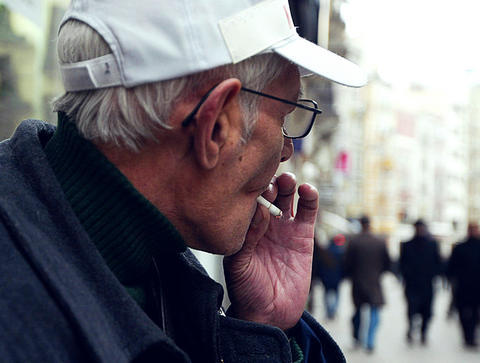Smoking is so widespread and deeply rooted in Turkey that even the French and the Italians -- no slouches themselves when it comes to lighting up -- have made "smoking like a Turk" their byword for chain smokers.
No more, says the Turkish parliament, which has just joined many other countries in Europe by enacting a law that will ban smoking in bars, restaurants and cafes as of next year.
Fair enough, for a country negotiating its entry into the EU.

PHOTO: AFP
But can the law be effectively applied, many Turks wonder, in a country that is not only a great consumer, but also a producer of tobacco -- the fifth in the world.
"I am a smoker of the times -- of course I will abide by the new law because I know tobacco is bad for you," said 22-year-old Murat, who would only give his first name.
"But Ankara winters are cold and stepping outside for a smoke is going to be torture," he said, a cigarette jiggling in the corner of his mouth during a chat in a smoky cafe in downtown Kizilay, the heart of the Turkish capital.
"Turks enjoy finding a way around the law as much as they enjoy smoking," Murat said, "so I wonder if this law will really work."
"We have a right to a smoke-free life," interrupted a young woman from the next table.
The Turkish parliament, dominated by the governing Islamist-rooted Justice and Development Party of Prime Minister Recep Tayyip Erdogan, passed the law on Jan. 3.
Turkish President Abdullah Gul, an avowed tobacco-hater like his close friend Erdogan, ratified the bill on Friday.
The new legislation allows for an 18-month "transition period" before the ban comes into effect.
It initially provided for smokers' zones in all public establishments, but was toughened during the parliamentary debate to an outright ban with heavy fines -- much to the chagrin of parliament's smokers, many of whom stayed away from the session rather than vote against and breach party discipline.
Once the law is in effect next year, anyone who lights up in a public place will be fined 50 Turkish lira (US$42) and the establishment allowing it a whopping 5,000 lira (US$4,200).
The toughest job may fall on law enforcers -- many of them heavy smokers themselves -- in a country where 60 percent of men and 20 percent of women admit to being smokers.
But smoking is a persistent habit despite ever increasing taxes -- more than 60 percent of the still relatively cheap average price of 4 lira a pack goes to the state -- because it is a social equalizer.
Before smoking was banned in all public transport several years ago, a cabbie's first friendly gesture to a fare climbing into his car was to offer a cigarette.
"What will we have left if smoking is banned -- how do we forget our woes?" bemoaned accountant Erkan Cakir, 40.
He covertly accused the conservative government of "acting like Murad IV," the 17th-century Ottoman sultan who punished smokers and drinkers with death -- only to die himself at 28 of cirrhosis contracted by his fondness for the bottle.

VAGUE: The criteria of the amnesty remain unclear, but it would cover political violence from 1999 to today, and those convicted of murder or drug trafficking would not qualify Venezuelan Acting President Delcy Rodriguez on Friday announced an amnesty bill that could lead to the release of hundreds of prisoners, including opposition leaders, journalists and human rights activists detained for political reasons. The measure had long been sought by the US-backed opposition. It is the latest concession Rodriguez has made since taking the reins of the country on Jan. 3 after the brazen seizure of then-Venezuelan president Nicolas Maduro. Rodriguez told a gathering of justices, magistrates, ministers, military brass and other government leaders that the ruling party-controlled Venezuelan National Assembly would take up the bill with urgency. Rodriguez also announced the shutdown

Civil society leaders and members of a left-wing coalition yesterday filed impeachment complaints against Philippine Vice President Sara Duterte, restarting a process sidelined by the Supreme Court last year. Both cases accuse Duterte of misusing public funds during her term as education secretary, while one revives allegations that she threatened to assassinate former ally Philippine President Ferdinand Marcos Jr. The filings come on the same day that a committee in the House of Representatives was to begin hearings into impeachment complaints against Marcos, accused of corruption tied to a spiraling scandal over bogus flood control projects. Under the constitution, an impeachment by the

Exiled Tibetans began a unique global election yesterday for a government representing a homeland many have never seen, as part of a democratic exercise voters say carries great weight. From red-robed Buddhist monks in the snowy Himalayas, to political exiles in megacities across South Asia, to refugees in Australia, Europe and North America, voting takes place in 27 countries — but not China. “Elections ... show that the struggle for Tibet’s freedom and independence continues from generation to generation,” said candidate Gyaltsen Chokye, 33, who is based in the Indian hill-town of Dharamsala, headquarters of the government-in-exile, the Central Tibetan Administration (CTA). It

A Virginia man having an affair with the family’s Brazilian au pair on Monday was found guilty of murdering his wife and another man that prosecutors say was lured to the house as a fall guy. Brendan Banfield, a former Internal Revenue Service law enforcement officer, told police he came across Joseph Ryan attacking his wife, Christine Banfield, with a knife on the morning of Feb. 24, 2023. He shot Ryan and then Juliana Magalhaes, the au pair, shot him, too, but officials argued in court that the story was too good to be true, telling jurors that Brendan Banfield set